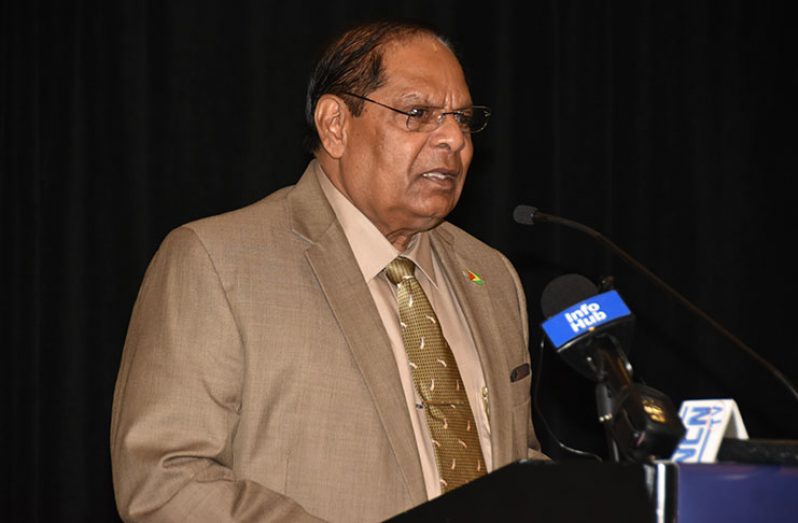— Gov’t to embark on nationwide civic education on Guyana-Venezuela border controversy
IN the coming days, the Foreign Affairs Ministry is expected to highlight the significance of the decision made by United Nations (UN) to send the Guyana/Venezuela border controversy to the World Court as part of a nationwide civic education, Prime Minister Moses Nagamootoo has said.
“Every child needs to know that the only just and lasting settlement of the controversy must flow from legal processes and that the World Court is the guarantor of these processes,” Prime Minister Nagamootoo said in his weekly column on Sunday.
He said Guyana has fought a long, hard and costly battle for a juridical resolution of the controversy, and the UN decision came as a vindication of the consistent and strenuous national efforts, particularly since the APNU+AFC Coalition came to office.
“We stood within the law, even when we took blows from the bigger, more powerful and aggressive neighbour. We suffered enormous damage to our economy and loss of investment opportunities. But the law has been and remains Guyana’s sword and shield!,” the prime minister said.
Mr Nagamootoo also took note of the statements expressed by seasoned diplomats who have hailed the decision as the best forward move, in what has been a stale and stagnated row that has troubled relations between two peaceful peoples on the shoulder of South America.

“The world is watching and it knows that in spite of the expected political bombast and braggadocio, the present Venezuelan regime, or a future government cannot wish away the jurisdiction of the ICJ, nor can it trifle with its persuasive and authoritative rulings — whether as opinions or advisories,” he said.
Meanwhile, in his online column “Conversation Tree”, Senior Counsel Ralph Ramkarran pointed out that by Article IV(1) of the 1966 Geneva Agreement the Governments of Guyana and Venezuela committed to choosing one of the means of peaceful settlement provided for by Article 33 of the Charter of the United Nations (UN), if the Mixed Commission did not arrive at a full agreement for the settlement of the controversy within four years.
Since the decision of the UNSG to refer the matter to the ICJ, Venezuela has spoken out in objection.
But Ramkarran reminded that judicial settlement was one of those means under Article 33.
Ramkarran noted that after the conclusion of the mandate of the Mixed Commission, the Governments of Guyana, Venezuela and the United Kingdom entered into an agreement known as the Port of Spain Protocol in June, 1970, which suspended the operation of Article IV of the Geneva Agreement for 12 years.
“This meant effectively that the formal search under Article IV for a resolution of the controversy was suspended for the period. Guyana and Venezuela undertook to ‘explore all possibilities of better understanding between them’,” he explained.
The Protocol of Port of Spain came to an end in 1982 and was not renewed, he recalled.
It was then that the parties agreed to refer the matter to the UNSG who selected the Good Officer process under Article 33 of the United Nations Charter.
“It eventually became clear to Guyana after 50 years of effort that the controversy could not be resolved by discussion and negotiation. A reference of the matter to the International Commission of Jurists, the World Court, appeared to be the only solution.
Guyana prevailed upon the UN Secretary-General to do so, as Venezuela would never have agreed. The UN Secretary-General, Ban Ki Moon, agreed, but with a proviso that an enhanced Good Officer Process should continue for another year and that he would only refer the matter if there was no significant progress. The Good Officer Process did not produce significant progress and so the UN Secretary-General referred the matter to the ICJ or World Court,” the Senior Counsel explained.
It was noted that the ICJ in its ruling will determine the validity of the Arbitral Award of 1899 but will not directly involve ownership of the territory.



.jpg)








